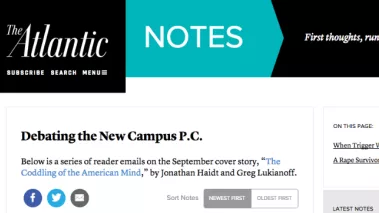Table of Contents
Praise for ‘The Coddling of the American Mind’

Everyone is talking about “The Coddling of the American Mind,” the new article by FIRE President and CEO Greg Lukianoff and best-selling author, New York University professor, and social psychologist Jonathan Haidt. The article, which examines the latest manifestation of political correctness on college campuses and how it may be harming students’ mental health, is the cover story of the September issue of The Atlantic and is currently available on newsstands. The online version of the article went live over two weeks ago and is still the Atlantic website’s most popular piece. It has over 4,000 comments and has been shared 368,000 times on Facebook and 18,000 times on Twitter.
Because “The Coddling of the American Mind” continues to generate so much reader feedback, this week The Atlantic is compiling and sharing some of the best responses to the article in a new section of its website called Notes. We wanted to share some highlights from the three comments that have been posted thus far.
One reader described a difficult day in literature class when she read a poem written from the perspective of someone jumping off a skyscraper. The reader’s sister had committed suicide using this very method, yet she did not think that her professor should have warned her about the poem. She writes:
Honestly, since all my professors knew I had mental issues, it was quite refreshing just for once to not be singled out, to be treated like a normal person.
A reader who self-identifies as a “dark-skinned Latino gay male” wrote that the new campus efforts and policies described in the article are condescending towards the marginalized groups they allegedly seek to protect:
They make me into a one-dimensional caricature of someone so fragile and innocent that my psyche must be protected at all costs. Worse yet, they assume that people like me aren’t mature enough to see the difference between “microaggressions” that are unintentional and thoroughly harmless, and the ones that are harmful. They also assume that people like me aren’t capable of withstanding and countering the latter.
A young instructor at an Ivy League university appreciated the distinction the article makes between the PC movement of the ’90s and the current attitude that pervades campus culture that the authors call “vindictive protectiveness”:
Vindictive protectiveness focuses ire on individual transgressions instead of systemic problems. It creates an atmosphere in which the administrative elite are more concerned with empty gestures than real change. They would rather use empty gestures—like, say, ousting a professor for making a joke about an assignment “killing” his students—to distract from an absence of real change, like preventing suicides on campus.
The instructor, who is a rape survivor, also stressed the importance of making sure that students continue to encounter emotionally challenging material:
[I] would rather read Toni Morrison and have her words wrack my soul than see books like hers, containing stories just a little like mine, vanish from college classrooms. These are books we must read. These are conversations we must have. Not in spite of traumatized students, but because of us.
Check out the full comments on the Notes section of The Atlantic’s website—it will be updated throughout the week with more reader feedback, both positive and negative. And if you haven’t already, make sure to read “The Coddling of the American Mind,” available online and on newsstands.
Recent Articles
FIRE’s award-winning Newsdesk covers the free speech news you need to stay informed.

As compliance deadline looms, colleges must resist censorship — and the feds must provide more clarity

This town fought residents over political yard signs — now it’s paying the price

Alex Kozinski on JD Vance’s censorship speech — First Amendment News 459
